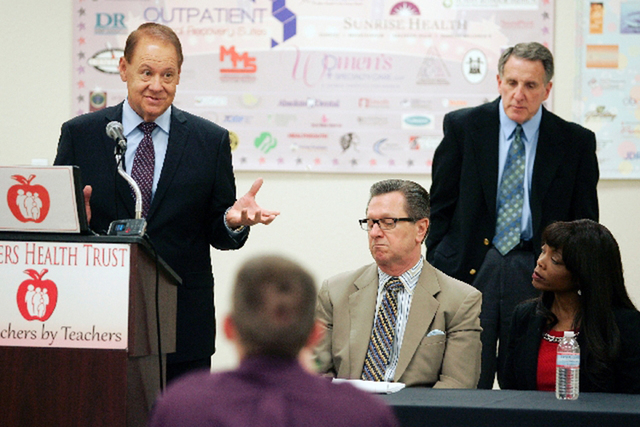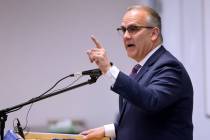Teachers forced to pay more while Health Trust stability spirals
Howard Hancock didn’t blame anyone when his husband got cancer.
But he certainly isn’t thanking the Clark County School District or the Clark County Education Association’s Teachers Health Trust, which is teetering on the verge of financial collapse, for making the chemotherapy his husband needs affordable.
Hancock, a math teacher at Sawyer Middle School, recently balked when he received a notice from the cash-strapped trust informing him that participants will soon be required to pay 20 percent of the cost for doctor’s office visits and all medical expenses. That’s on top of teachers’ current copayments. The increased financial burden on teachers stems from the trust’s need to resolve “immediate cash flow issues.”
With his husband only halfway through a chemotherapy plan to treat his non-Hodgkin’s lymphoma, Hancock estimated the couple will have to shoulder several thousand dollars per treatment round under the new coinsurance rate.
“When was the last time (the teachers union) was able to negotiate an additional contribution to our health care plan from CCSD?” he asked.
“Employees had to increase their contribution to THT last year, and yet CCSD contributed nothing more for health insurance,” Hancock said. “Instead, we got a 1 percent salary increase (and) that annual increase won’t even cover the additional coinsurance for one chemotherapy treatment.”
‘TOTAL DEVASTATION’
Many of Clark County’s 18,000 public school teachers and their dependents also are likely to rush to make appointments with doctors before the coinsurance rate hikes kick in July 23.
The teachers union, which controls the health trust, expects that rush to increase the financial strain now plaguing the trust.
“Every teacher in their right mind will get their dental surgery done or get new glasses before July,” said a high-ranking union member who attended a May 25 meeting about the trust’s financial distress.
In that meeting, CCEA Executive Director John Vellardita confirmed the coinsurance rates were only a “short-term fix” to sustain the trust for a few more months. By November, Vellardita said, the trust no longer will function in its current form and must “evolve into something different.”
“I knew this was coming,” the member said. “But it was a surprise just how bad it was. It’s total devastation.”
In a phone interview on Tuesday, Vellardita declined to discuss details of the trust’s future.
He did note, however, that it could take the shape of a districtwide health plan for all employees. Currently, administrators, police officers, support staff and teachers are insured under separate health care plans.
“A districtwide health plan is something that all parties would have to adopt,” said Vellardita of the bargaining groups involved. “In the meantime, we’re making these short-term changes and we’ll introduce a new plan as we move forward.
“That plan may or may not be the districtwide plan.”
The consolidated health plan could save the Teachers Health Trust from more years of operating in the red. The cost of claims to the trust has been outstripping revenues since at least 2010.
An audit released in November cites a loss of nearly $3.9 million in 2013-14, up from $1.4 million in the 2012-13 school year. Meanwhile, net assets available for plan benefits tumbled from $41.8 million in the 2011-12 school year to less than $27.9 million last school year.
The trust also has exhausted its cash reserves, which sat at a hefty $7.7 million in June 2013 and sank to zero within one year.
About $116 million of the trust’s annual revenue comes from the district, which contributes $539 per teacher per month for their coverage. That amount hasn’t changed since 2008.
“For the last four successive contract negotiations, we’ve put proposals on the table asking for (higher) contributions toward premiums on the part of the employer,” Vellardita said. “The district could not agree to that (but) we certainly have been asking.”
The district would not make representatives available for comment. But in a statement, it confirmed the School Board allowed the trust to implement its new coinsurance rates.
“CCSD will continue to monitor any changes to health insurance for its teachers,” the statement reads.
At a meeting last week, board members mostly declined to comment on the struggling health trust or what information it shared during closed-door negotiations to persuade board members to approve the changes.
“It’s a backroom negotiation thing so the conversation that we have in the backroom is not open to the public,” District F Trustee Carolyn Edwards said. Teachers “need to talk to their union. It’s not our health trust. It’s the union’s health trust.”
CLIMBING COST CONTRIBUTORS
While Vellardita claimed he wasn’t privy to financial details of the trust, he explained that the general rise in the cost of health care and new taxes from the Affordable Care Act have increased its expenses while revenue remains flat.
He also pointed to the trust’s predominantly female participant pool.
“The majority of the participants are not a younger pool of participants, so you have claims related to say maternity and other women health issues,” Vellardita said.
“This is a classic story of how much does a very good health plan cost and how much are people willing to pay for it,” he added. “What we have seen in the last few years is a sea change in medical economics.”
That explanation failed to satisfy Hancock, who still wonders how his family will pay for his husband’s chemotherapy.
More negotiations won’t help solve that, he said.
“The issue of health care has been discussed and negotiated for years,” said Hancock, a 13-year teacher. “The only thing that’s changed is teachers are paying more than ever for insurance premiums while our copays, prescription costs and now our coinsurance (have) continued to climb.
“Really, years of negotiations on health care have resulted in CCSD sticking it to the teachers and CCEA letting them get by without contributing one more penny toward health care cost. CCEA should be ashamed.”
Contact Neal Morton at nmorton@reviewjournal.com or 702-383-0279. Find him on Twitter: @nealtmorton
RELATED
Struggling union health trust increases payment burden for CCSD teachers
Health trust for Clark County teachers in trouble
Teachers Health Trust no longer issue in contract talks




























